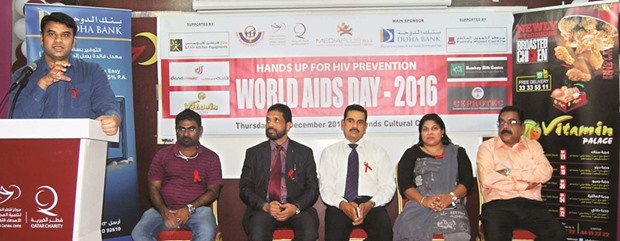Concentrated efforts through a combination of education, awareness and treatment, the world can effectively target eradicating the Aids epidemic, said Dr Amal Konikkuzhiyil of Imara Health Clinic, speaking at a gathering of Indian community on the occasion of World Aids Day in Doha recently. Urging the community to join hands in the fight against Aids, the medical expert stressed that medical and moral treatments are essential to tackle the situation.
He was delivering a keynote address to a large gathering jointly organised by Friends Cultural Centre, Anti Smoking Society and Mediaplus. “The day is an opportunity for public and private partners to disseminate information about the status of the pandemic and to encourage progress in HIV/Aids prevention, treatment and care around the world, particularly in high prevalence countries,” said Dr Amal.
World Aids Day is observed on December 1 every year to raise awareness about HIV/Aids and to demonstrate international solidarity in the face of the pandemic.
HIV/Aids remains one of the world’s most significant public health challenges, particularly in low and middle-income countries. As a result of recent advances in access to antiretroviral therapy (ART), HIV-positive people now live longer and healthier lives. In addition, it has been confirmed that ART prevents onward transmission of HIV.
“With access to treatment, people living with HIV are living longer. Investing in treatment is paying off, but people older than 50 who are living with HIV, including people who are on treatment, are at increased risk of developing age-associated diseases, affecting HIV disease progression,” the doctor told the audience.
He quoted the UN secretary-general as saying that the world has committed to end the Aids epidemic by 2030 as part of the Sustainable Development Goals. We are seeing that countries are getting on the fast track – more than 18mn people are on life-saving HIV treatment and country after country is on track to virtually eliminate HIV transmission from mother to child.
“Aids is not over, but it can be if we tailor the response to individual needs at particular times in life. Whatever our individual situation may be, we all need access to the tools to protect us from HIV and to access antiretroviral medicines should we need them,” he added.
A life-cycle approach to HIV that finds solutions for everyone at every stage of life can address the complexities of HIV. Risks and challenges change as people go through life, highlighting the need to adapt HIV prevention and treatment strategies from birth to old age.
“The success we have achieved so far gives us hope for the future, but as we look ahead we must remember not to be complacent. We cannot stop now. This is the time to move forward together to ensure that all children start their lives free from HIV, that young people and adults grow up and stay free from HIV and that treatment becomes more accessible so that everyone stays Aids-free,” he said.
Mediaplus CEO Amanulla Vadakkangara chaired the function. He exhorted the audience to strive hard and bring back moral and ethical values to life. “In most cases, Aids is a result of immoral living and we have to check it by bringing back orderly family life and moral values. We have to prevent the spread of Aids through moral and cultural shields,” said Vadakkangara.
Imara Health Clinics CEO Abdul Hakeem, Vitamin Palace Regional Director Aboobacker Sidheeq and Ceprotec Operations Manager Rajeev Nair attended the function as guests of honour.
The event started by screening two short videos produced by UN that promote the life-cycle approach to HIV prevention, finding HIV solutions for everyone, at every stage of life. All guests and attendees wore red ribbons expressing support and solidarity with millions of people affected with HIV.
Volunteers also displayed placards highlighting the importance of education and awareness at grass root level to check the spread of this fatal disease in our society.
World Aids Day is one of the eight official global public health campaigns marked by the World Health Organisation (WHO), along with World Health Day, World Blood Donor Day, World Immunisation Week, World Tuberculosis Day, World No Tobacco Day, World Malaria Day and World Hepatitis Day. Since 1995, the president of the United States has made an official proclamation on World Aids Day.
World Aids Day, designated on December 1 every year since 1988, is dedicated to raising awareness of the Aids pandemic caused by the spread of HIV infection, and mourning those who have died of the disease. Government and health officials, non-governmental organisations and individuals around the world observe the day, often with education on Aids prevention and control.

KEYNOTE ADDRESS: Dr Amal Konikkuzhiyil of Imara Health Clinic speaking on the occasion.
